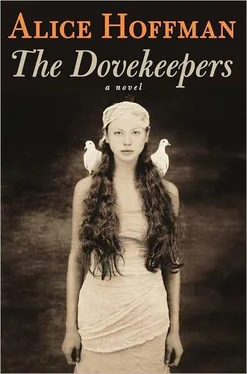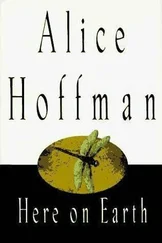Alice Hoffman - The Dovekeepers
Здесь есть возможность читать онлайн «Alice Hoffman - The Dovekeepers» весь текст электронной книги совершенно бесплатно (целиком полную версию без сокращений). В некоторых случаях можно слушать аудио, скачать через торрент в формате fb2 и присутствует краткое содержание. Год выпуска: 2011, ISBN: 2011, Жанр: Историческая проза, на английском языке. Описание произведения, (предисловие) а так же отзывы посетителей доступны на портале библиотеки ЛибКат.
- Название:The Dovekeepers
- Автор:
- Жанр:
- Год:2011
- ISBN:978-1-4516-1749-8
- Рейтинг книги:2.5 / 5. Голосов: 2
-
Избранное:Добавить в избранное
- Отзывы:
-
Ваша оценка:
- 60
- 1
- 2
- 3
- 4
- 5
The Dovekeepers: краткое содержание, описание и аннотация
Предлагаем к чтению аннотацию, описание, краткое содержание или предисловие (зависит от того, что написал сам автор книги «The Dovekeepers»). Если вы не нашли необходимую информацию о книге — напишите в комментариях, мы постараемся отыскать её.
The Dovekeepers — читать онлайн бесплатно полную книгу (весь текст) целиком
Ниже представлен текст книги, разбитый по страницам. Система сохранения места последней прочитанной страницы, позволяет с удобством читать онлайн бесплатно книгу «The Dovekeepers», без необходимости каждый раз заново искать на чём Вы остановились. Поставьте закладку, и сможете в любой момент перейти на страницу, на которой закончили чтение.
Интервал:
Закладка:
Alice Hoffman
The Dovekeepers
Let my burden be your burden, and yours be mine

Part One. Summer 7 °C.E
The Assassin’s Daughter
We came like doves across the desert. In a time when there was nothing but death, we were grateful for anything, and most grateful of all when we awoke to another day.
W e had been wandering for so long I forgot what it was like to live within walls or sleep through the night. In that time I lost all I might have possessed if Jerusalem had not fallen: a husband, a family, a future of my own. My girlhood disappeared in the desert. The person I’d once been vanished as I wrapped myself in white when the dust rose into clouds. We were nomads, leaving behind beds and belongings, rugs and brass pots. Now our house was the house of the desert, black at night, brutally white at noon.
They say the truest beauty is in the harshest land and that God can be found there by those with open eyes. But my eyes were closed against the shifting winds that can blind a person in an instant. Breathing itself was a miracle when the storms came whirling across the earth. The voice that arises out of the silence is something no one can imagine until it is heard. It roars when it speaks, it lies to you and convinces you, it steals from you and leaves you without a single word of comfort. Comfort cannot exist in such a place. What is brutal survives. What is cunning lives until morning.
My skin was sunburned, my hands raw. I gave in to the desert, bowing to its mighty voice. Everywhere I walked my fate walked with me, sewn to my feet with red thread. All that will ever be has already been written long before it happens. There is nothing we can do to stop it. I couldn’t run in the other direction. The roads from Jerusalem led to only three places: to Rome, or to the sea, or to the desert. My people had become wanderers, as they had been at the beginning of time, cast out yet again.
I followed my father out of the city because I had no choice.
None of us did, if the truth be told.
I DON’T KNOW how it began, but I know how it ended. It occurred in the month of Av, the sign for which is Arieh, the lion. It is a month that signifies destruction for our people, a season when the stones in the desert are so hot you cannot touch them without burning your fingers, when fruit withers on the trees before it ripens and the seeds inside shake like a rattle, when the sky is white and rain will not fall. The first Temple had been destroyed in that month. Tools signified weapons and could not be used in constructing the holiest of holy places; therefore the great warrior king David had been prohibited from building the Temple because he had known the evils of war. Instead, the honor fell to his son King Solomon, who called upon the shamir, a worm who could cut through stone, thereby creating glory to God without the use of metal tools.
The Temple was built as God had decreed it should be, free from bloodshed and war. Its nine gates were covered with silver and gold. There, in the most holy of places, was the Ark that stored our people’s covenant with God, a chest made of the finest acacia wood, decorated with two golden cherubs. But despite its magnificence, the first Temple was destroyed, our people exiled to Babylonia. They had returned after seventy years to rebuild in the same place, where Abraham had been willing to offer his son Isaac as a sacrifice to the Almighty, where the world had first been created.
The second Temple had stood for hundreds of years as the dwelling place of God’s word, the center of creation in the center of Jerusalem, though the Ark itself had disappeared, perhaps in Babylonia. But now times of bloodshed were upon us once more. The Romans wanted all that we had. They came to us as they swarmed upon so many lands with their immense legions, wanting not just to conquer but to humiliate, claiming not just our land and our gold but our humanity.
As for me, I expected disaster, nothing more. I had known its embrace before I had breath or sight. I was the second child, a year younger than my brother, Amram, but unlike him entirely, cursed by the burden of my first breath. My mother died before I was born. In that moment the map of my life arose upon my skin in a burst of red marks, speckles that, when followed, one to the other, have led me to my destiny.
I can remember the instant when I entered the world, the great calm that was suddenly broken, the heat of my own pulse beneath my skin. I was taken from my mother’s womb, cut out with a sharp knife. I am convinced I heard my father’s roar of grief, the only sound to break the terrible silence of one who is born from death. I myself did not cry or wail. People took note of that. The midwives whispered to one another, convinced I was either blessed or cursed. My silence was not my only unusual aspect, nor were the russet flecks that emerged upon my skin an hour after my birth. It was my hair, the deep bloodred color of it, a thick cap growing, as if I already knew this world and had been here before.
They said my eyes were open, the mark of one set apart. That was to be expected of a child born of a dead woman, for I was touched by Mal’ach ha-Mavet, the Angel of Death, before I was born in the month of Av, on the Tisha B’Av, the ninth day, under the sign of the lion. I always knew a lion would be waiting for me. I had dreamed of such creatures ever since I could remember. In my dreams I fed the lion from my hand. In return he took my whole hand into his mouth and ate me alive.
When I left childhood, I made certain to cover my head; even when I was in my father’s courtyard I kept to myself. On those rare occasions when I accompanied our cook to the market, I saw other young women enjoying themselves and I was jealous of even the plainest among them. Their lives were full, whereas I could think only of all I did not have. They chirped merrily about their futures as brides as they lingered at the well or gathered in the Street of the Bakers surrounded by their mothers and aunts. I wanted to snap at them but said nothing. How could I speak of my envy when there were things I wanted even more than a husband or a child or a home of my own?
I wished for a night without dreams, a world without lions, a year without Av, that bitter, red month.
WE LEFT the city when the second Temple was set in ruins, venturing forth into the Valley of Thorns. For months the Romans had defiled the Temple, crucifying our people inside its sacred walls, stripping the gold from the entranceways and the porticoes. It was here that Jews from all over creation traveled to offer sacrifices before the holiest site, with thousands arriving at the time of the Feast of Unleavened Bread, all yearning to glimpse the gold walls of the dwelling place of God’s word.
When the Romans attacked the third wall, our people were forced to flee from that part of the Temple. The legion then brought down the second wall. Still it was not enough. The great Titus, military leader of all Judea, went on to construct four siege ramps. Our people destroyed these, with fire and stones, but the Romans’ assault of the Temple walls had weakened our defenses. Not long afterward a breach was accomplished. The soldiers entered the maze of walls that surrounded our holiest site, running like rats, their shields lifted high, their white tunics burning with blood. The holy Temple was being destroyed at their hands. Once this happened, the city would fall as well, it would be forced to follow, sinking to its knees like a common captive, for without the Temple there would be no lev ha-olam, no heart of the world, and nothing left to fight for.
Читать дальшеИнтервал:
Закладка:
Похожие книги на «The Dovekeepers»
Представляем Вашему вниманию похожие книги на «The Dovekeepers» списком для выбора. Мы отобрали схожую по названию и смыслу литературу в надежде предоставить читателям больше вариантов отыскать новые, интересные, ещё непрочитанные произведения.
Обсуждение, отзывы о книге «The Dovekeepers» и просто собственные мнения читателей. Оставьте ваши комментарии, напишите, что Вы думаете о произведении, его смысле или главных героях. Укажите что конкретно понравилось, а что нет, и почему Вы так считаете.












